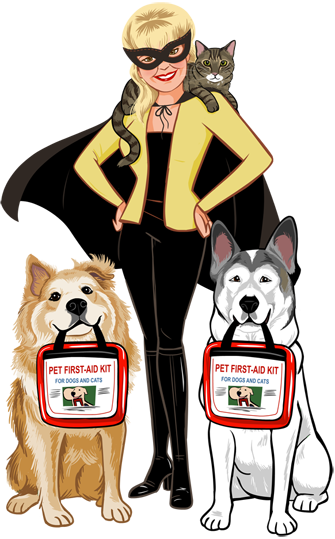
When your dog isn’t feeling well, he cannot speak up and let you know. However, there are signs you can look for which can help determine when your dog is feeling poorly. No one wants to see their dog suffering, so tune in and pay attention, do a weekly head-to-tail check to find problems at onset and notice if any of the following behaviors occur:
Change in Behavior
If your pooch is normally very energetic and loves nothing more than going on walks, you’ll instantly know something is up when he reluctantly goes outside or is not interested in playing his favorite games with you. Should your pooch start acting agitated or irritable, this could be a sign that he’s not feeling his best. Whether it’s an illness, stress, anxiety or anything out of the norm, behavioral changes should never be ignored.
Appearance
Like with humans, a change in how your dog looks should provide clues that something is not quite right. Your dog’s eyes should be clear and white around the iris. If you notice redness, excessive tearing or cloudiness, something is wrong. Ears should look clean and healthy too! An unpleasant smell or catching your dog rubbing or scratching at them clearly shows discomfort. If you have any doubts, ask your vet.
Vomiting or Diarrhea
If your canine is vomiting or has diarrhea, that is definitely not normal! Whether it’s a viral infection, gastroenteritis, or intestinal parasites, only your veterinarian knows for sure. Native Pet has more information dog diarrhea which explains the causes behind it, and treatment methods. As well as dog diarrhea, Native Pet have guides on other illnesses relating to pet health. No one wants to see their dog unwell, so if you have any concerns, don’t hesitate in making a vet appointment.
Breathing Problems
Coughing and wheezing are both signs that your dog isn’t feeling his best or may even be in great distress. Sometimes these signs may be accompanied by other symptoms: runny nose, fever, or soreness around the eyes. In small breeds like a pug or Boston terrier, coughing could be a result of tracheal collapse, which could lead to choking and pulmonary arrest. Breathing issues should be immediately addressed by your dog’s 2nd best friend, his veterinarian!
Fever
When a dog feels poorly, he may have a higher than normal body temperature, aka a fever. Signs to look out for include a dry nose, lack of energy, redder gums and eyes, shivering and warm ears. If you’re not sure whether your dog has a fever or not, gently take his temperature. Bear in mind, however, that your dog’s normal temperature will be warmer than your own. A healthy temperature in your dog should be around 101 degrees. Should their temperature be over 103 degrees, don’t delay in consulting with your vet.
Unexplained Weight Gain or Loss
We all know how much dogs love to eat! Whatever they can grab their paws on, they will voraciously consume. However, if you’ve noticed your dog is putting on weight or losing poundage without you working with him to do so, this could be a cause for concern. Sudden weight gain or loss could be a sign of a health issue. Best course of action is to have your best pal evaluated by a vet.
Change in Drinking Habits
Your dog needs to drink lots of water to keep hydrated. However, if he’s drinking more or less water than normal, this could be a sign your dog isn’t well. Drinking too little water could signal that your canine isn’t feeling good. On the other hand, drinking too much water may signal your dog has diabetes, hormone issues, or a fever. It’s your job as your pet’s caretaker, to monitor his water intake. Make sure you always have a clean bowl of fresh water available, maybe several in convenient places around your home. If input has increased, how about output? Is your dog asking to go outside more often? If not, where is that extra water going or are his kidneys in trouble. A vet check in with all the information you can provide will help you to help your dog.
If your dog, or one you care for, has a change in behavior, habits or appearances, your veterinarian is your best bet at getting to the root of what ails your dog. Never ignore even the most subtle of changes. They are how your dog is communicating with you, his best friend!









